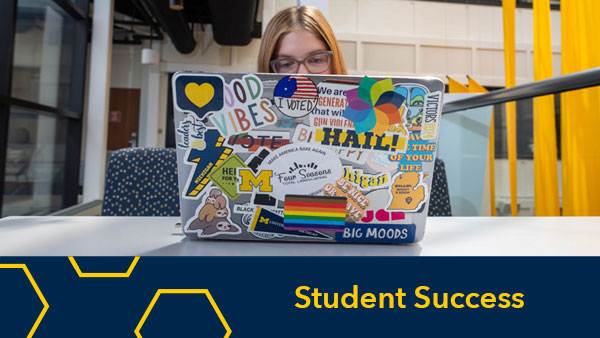Steven Lonn, Ph.D, Assistant Director, Assessment and Evaluation at the Office of Digital Education & Innovation
@stevelonn
 On any given day at the University of Michigan, there are hundreds of guest lectures, student group events, workshops, tutorials, and exhibits that present a tremendous variety of learning opportunities to the student community that are only available in this rich residential setting. Unfortunately, U-M does not yet have a comprehensive way to track, recognize, or validate these learning opportunities, nor provide a framework to help integrate them into students’ curricular pathways.
On any given day at the University of Michigan, there are hundreds of guest lectures, student group events, workshops, tutorials, and exhibits that present a tremendous variety of learning opportunities to the student community that are only available in this rich residential setting. Unfortunately, U-M does not yet have a comprehensive way to track, recognize, or validate these learning opportunities, nor provide a framework to help integrate them into students’ curricular pathways.
Digital badges may be one way to facilitate this process. The digital nature of these certifications allow rich metadata about the specific setting, requirements, and the learners’ own evidence to travel with the badge. This provides students with an avenue for personalized and reflective learning at specific and contextualized moments over time. Utilizing the Mozilla Open Badges framework, digital badges allow learners to legitimize their learning and growth wherever it occurs and connect their skills and competencies with their academic and professional careers in an open, transportable, and validated format.
 At U-M, an exploration into using digital badges to recognize co-curricular learning began with a Teaching & Learning in a Third Century Quick Wins Grant in Winter 2014 investigating how undergraduate engineers could use digital badges to integrate their out-of-class activities with their professional identities. In Fall 2014, the UM 3D Lab and the School of Information Entrepreneurship Program launched pilots of their own. In a student-generated naming competition, the participating students voted to name U-M digital badges “Mblem” — in many ways, these badges are emblematic of the unique learning opportunities available at a premier residential research institution. To date, nearly 400 Mblem digital badges have been issued in recognition of students’ varied experiences, skills, and competencies.
At U-M, an exploration into using digital badges to recognize co-curricular learning began with a Teaching & Learning in a Third Century Quick Wins Grant in Winter 2014 investigating how undergraduate engineers could use digital badges to integrate their out-of-class activities with their professional identities. In Fall 2014, the UM 3D Lab and the School of Information Entrepreneurship Program launched pilots of their own. In a student-generated naming competition, the participating students voted to name U-M digital badges “Mblem” — in many ways, these badges are emblematic of the unique learning opportunities available at a premier residential research institution. To date, nearly 400 Mblem digital badges have been issued in recognition of students’ varied experiences, skills, and competencies.
Digital badges can be used to not only facilitate student learning at U-M, but also recognize faculty and staff knowledge as well. One experiment in this area is a new series of Canvas Mblems offered by the Teaching and Technology Collaborative to promote the growing of expertise of this new learning management system. Over 375 Canvas Mblems have already been awarded in May 2015 as part of this pilot initiative.
The Learning, Education & Design (LED) Lab is investigating how digital badges can mediate formal and informal learning in higher education and how the metadata contained within the badges can be utilized to better understand learners’ motivations, identity, and integration of disparate educational contexts. In order to build on the initial success of the pilot programs toward a rich ecosystem of digital badge use at Michigan, there have been several events over the  course of the Winter 2015 term designed to engage the U-M community around the concept of digital badges, including two very popular LED / CRLT workshops attended by over 70 members of the Michigan community. DEI is committed to promoting personalized and lifelong learning opportunities through creative uses of technology that help redefine the residential education experience — a vibrant and integrated curricular and co-curricular ecosystem of Mblem digital badges could be an important component of that new vision.
course of the Winter 2015 term designed to engage the U-M community around the concept of digital badges, including two very popular LED / CRLT workshops attended by over 70 members of the Michigan community. DEI is committed to promoting personalized and lifelong learning opportunities through creative uses of technology that help redefine the residential education experience — a vibrant and integrated curricular and co-curricular ecosystem of Mblem digital badges could be an important component of that new vision.
Please visit the Mblem website for more information, or nominate your unit or program for a digital badges pilot.


